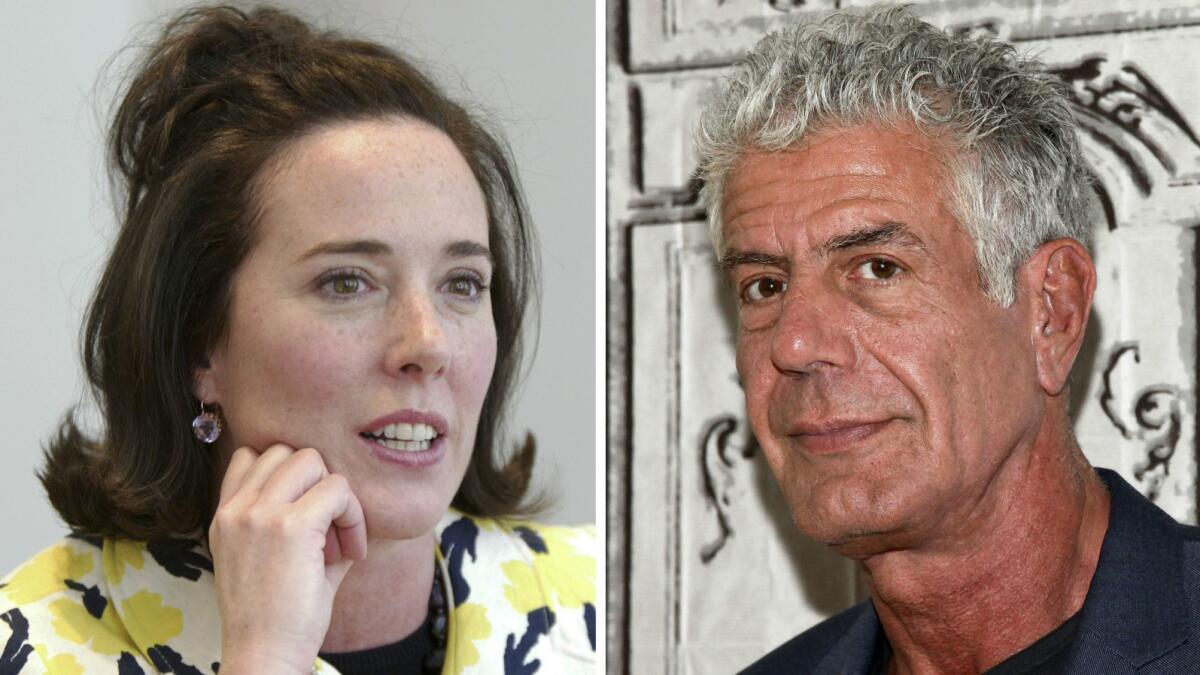Readers React: That frank discussion on suicide and depression experts say we need? Readers are having one — and it’s raw

As the Los Angeles Times’ letters editor, I have been struck over the years by how candidly readers often discuss issues relating to their own mortality or that of loved ones. When the paper publishes news articles or opinion pieces on, say, aid-in-dying laws or terminal illness, some readers respond by sharing their emotionally stirring, deeply personal experiences on those subjects.
Where that had not typically applied was suicide and depression — at least until the last few weeks, with the deaths of fashion designer Kate Spade and chef, author and TV personality Anthony Bourdain, both of whom reportedly lived with depression. Now, as mental health professionals warn of a “suicide contagion,” there have been calls for a more open discussion on depression — and some L.A. Times readers are obliging.
Here is a handful of the reactions we’ve received to the deaths this month of Spade and Bourdain. Warning: Some may find the letters uncomfortably frank.
Russ Woody of Studio City gets into the head of someone who may be depressed and suicidal:
The op-ed article Sunday by Kerry Madden-Lunsford certainly makes many excellent points, but unfortunately for some it focuses more on keeping the suicidal person alive, rather than finding a permanent cure for depression — which is largely the cause of suicide.
Yes, there are treatments for the disease, but they are often hit and miss and certainly not permanent. By asking the depressed person to stay alive, without a reasonable or permanent solution, he or she is being asked to continue suffering extraordinary pain so that those around them don’t have to feel bad.
That is what the depressed person hears, anyway.
The answer lies in finding a cure, not just beseeching a suffering person to continue suffering.
Evelyn Quinn of Pasadena speaks up for the people left behind:
I’ve lived through a close family member’s suicide and was charged with cleaning up the hideous and painful aftermath. So every time there’s another report of a celebrity suicide, my anger tears open that wound anew. And please don’t talk to me about depression — I’ve struggled with it for decades and could write entire books about my journey.
For me, dealing with the death of my loved one was something akin to being on the receiving end of a flamethrower. Suicide is simply an unforgivable act to lay at the feet of the innocent. In all likelihood, the deaths of Spade and Bourdain will emotionally cripple their children for life.
As a parent, I want to howl and smash things when reading about suicide. I’ve slogged my way through round after round of different medications and therapies fighting depression. At the front of my mind in this fight were my children and family. They were enough motivation for me to keep fighting.
The children of Bourdain and Spade might forever ask why they weren’t enough to save their parents. And for this, I can’t forgive them.
Fallbrook resident Joe Dimino believes that in this case, it may not be wrong to speak ill of the dead:
Since the recent celebrity suicides, there has been an outpouring of grief and consolation, along with information on identifying depressed people and how to talk about suicide. That’s a normal, intuitive reaction in a society that cherishes life.
But suicide is not normal. It runs contrary to humanity and life. Our responses, therefore, should also be counterintuitive.
After Robin Williams took his own life in 2014, Columbia University researchers discovered a 10% increase in suicides over the next four months. That’s nearly 2,000 additional lives lost. Danish researchers found that individuals in families with a history of suicides were two and a half times more likely to kill themselves, as opposed to individuals in families without a suicide history.
Did Bourdain and Spade appreciate how their actions would encourage others potentially to take their own lives? Probably not. We should shift away from paying tribute to their life accomplishments, because their suicides may contribute to more premature deaths. Numbers don’t lie.
Follow the Opinion section on Twitter @latimesopinion and Facebook
More to Read
A cure for the common opinion
Get thought-provoking perspectives with our weekly newsletter.
You may occasionally receive promotional content from the Los Angeles Times.











